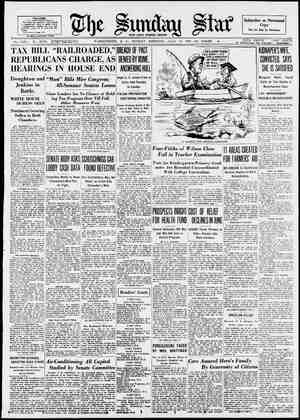Evening Star Newspaper, July 14, 1935, Page 84
You have reached the hourly page view limit. Unlock higher limit to our entire archive!
Subscribers enjoy higher page view limit, downloads, and exclusive features.
6 Magazine Section SUMMARY OF CHAPTER I {3 LL passengers look gosh-awful their first day at sea,” thought Christo- phine. And then she saw him — and changed her mind. “If you turn out to be anything except what you look,” she muttered to herself, I shall cut your throat. No man has any right to be so attractive and not live up to it."” When she met him, he did not fail her; he was charming and delightful and friendly. In no time at all, she was telling him all about herself — how the sudden death of H. Kattle- burg, the motor king, had ended her six-year European job as his secretary, with nothing left to show for her capable labors but a letter which he had left her to deliver to his heiress daughter in America: how her return to her native land was something to be endured, since, after living in Paris, she had a very low opinion of her own country. The handsome man was unmistakably interested in Christophine, and she found herself completely forgetting Clive Harding, Christophine Discovers America And gets as far as Philadelphia in a new adventure serial by NINA WILCOX PUTNAM the New York suitor whom she had decided, now that she was up against it, she might as well marry. And then the new acquaintance told her who he was: the Italian Prince Mario Stefano Emilio di Rigoni. She nearly collapsed. While she was recovering, he explained why every- one took him for an American. He really was, on his mother's side. While touring Europe as a young girl, his mother had met and married his father, and divorced him even before he. the son, had been born. His mother, who had returned to her home in Omaha, had brought him up just like any other American boy; then his father had died in Italy, and he had been sent for. It was all very strange in Italy, he told Christophine. He found that his family there was one of the oldest, that he was considered by his countless relatives and by the peasant families that lived on their vast ancestral properties to be the Head of the Family. Strangest of all, they looked upon him as the savior of their lands and fast-dwindling fortunes. 1 felt my responsibility,” he said gravely. It got so I couldn't sleep nights, wondering what the devil to do. Finally. for their sake, 1 consented to take that which, according to their standards, was the only course." **And that was?" He looked at her pleadingly, as if for for- Iltustration by Frank Bensing “Good heavens'” said the man, after he had kissed her. “I thought you were my sister” July 14, 1935 giveness, “To marry money,’" he said slowly. Hardly knowing what she did, Christophine sprang to her feet. ‘‘I must go! Thanks for an amusing evening. And good luck!' Then she added, ““I'm marrying for money myself when I reach New York. Good night, my dear Prince."” But when she reached her cabin, she wept. CHAPTER 11 HE trouble with being a sophisticate is that it's such a lot of bother remembering never to believe in anyvthing. My Paris-American friends had taught me some of the outward gestures of sophistication, but there must have been a weakness in me somewhere because, for the entire remainder of that awful ocean voyage, I kept having great surges of indignation about the Prince's cold-blooded plan to marry money. Not that he knew it, for we scarcely spoke. Of course 1 en- countered him now and then, usually under the wing of his fat old aunt who bristled odd bows, laces and bits of jewelry from every acre of her ponder- ous body. Sometimes we nodded coolly, sometimes pretended not to have seen one another. But after each of these occasions, 1 would hold long, garrulous im- aginary conversations with him in which I told him exactly what I thought. Then ! would be furious with myself for wasting so much energy, and try to switch my mind to my own affairs and what lay at my journey's end. And when that end was finally reached, the Prince and I did not even say gooabye. He was buried in a press-and-camera huddle while I, feeling unreason- ably lonely and sorry for myself, stood at the rail trying not to look at the Statue of Liberty. “Isn't it grand?’ said a woman standing next to me, her honest, homely red face wet with sentimental tears. ‘‘Don't it seem wonderful to see Her again? Almost seems like she'd comeout towelcomeus,don'tit?"’ “She could do with a clean- ing!" I said drily. But despite myself I looked, and something inside me stirred. The throb of patriotic emotion was as involuntary and uncon- trollable as a hiccough and, to me, just as annoying. “I hope the mist clears,’ the sentimentalist went on. “I'm just dying to see the skyline again, ain’'t you?" “I've seen it in the movies so often,” I retorted, ‘‘that if I seeit once more, I shall likely die." But I was wrong about the skyline of Manhattan. The mist lifted suddenly, and cold blue sunshine flooded the ramparts of America’s man-made Gibraltar. My first feeling was one of utter disbelief. The city could not have grown that much in six years! Was this the New York which I'd been told, in Europe, was a wreck of its former self? + My astonishment increased as we moved slowly into the North River, and I saw the midtown (Continued on page 13)
